29 Oct2019
By Caitlin Wilson

Join AACTE for a webinar, Teacher to Principal: Educational Leadership Tracking Systems, which will take a closer look at the leader tracking systems created as part of the Wallace Foundation’s Principal Pipeline Initiative. Nicholas Pelzer, program officer from the Wallace Foundation will provide an overview on how the leader tracking systems were developed. Leslie Anderson, managing director of Policy Studies Associates and Tricia McManus, assistant superintendent of leadership, professional development, and school transformation, Hillsborough County Public Schools, will share their perspectives and experiences on how data-driven decision making can inform the recruitment, preparation, and placement of principals.
Please register and attend this webinar on November 6 at 1:00 p.m. to consider how leader tracking systems can strengthen both teacher and leadership pipelines through partnerships with local school districts.
25 Oct2019
By Beth Day
The U.S. Department of Education has awarded the Southern Regional Education Board a $5.3 million, 5-year Teacher Quality Partnership grant to create a residency-based teacher preparation program with Georgia College & State University.
The Georgia Residency for Educating Amazing Teachers will recruit undergraduate STEM majors who aspire to become middle grades math and science teachers. They will complete an online Master of Arts in Teaching during a year-long residency—practice teaching supervised by a mentor-teacher— in a high-needs middle grades classroom.
Rural school districts served by the Oconee Regional Education Service Agency in central Georgia will be the primary partners for hosting the residents in classrooms. SREB and Georgia College will support mentor-teachers and residents with coaching and specialized training on topics like project-based learning.
Over the course of the grant, 60 students will become fully certified to teach middle grades math or science in Georgia; some will also complete a computer science endorsement.
The newly certified teachers will then teach in a local school for two years with support from mentor-teachers and SREB instructional coaches. Participants agree to teach in their assigned schools for one year beyond this two-year induction period.
25 Oct2019
By Joe Levine
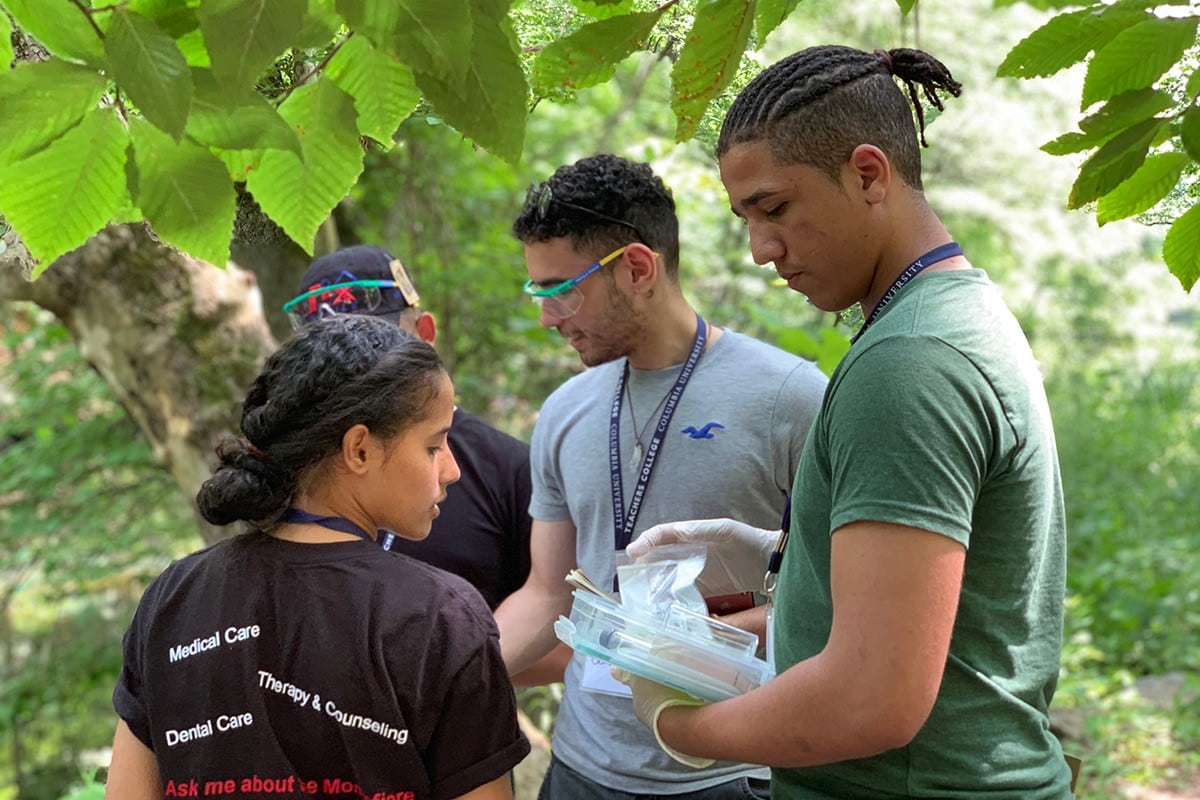
(Photo: TR@TC)
This article and photo originally appeared Teachers College, Columbia University website and are reprinted with permission.
Teachers College, Columbia University has won a third round of federal funding for TR@TC, its 18-month teaching residency program. The College has received a Teacher Quality Partnership (TQP) grant of $468,438 from the U.S. Department of Education for the coming year, with a projected total grant of $5,985,870 over the next five years contingent on continued federal funding and the ongoing success of the program.
The grant will fund 15 new residents this coming year, and 20 new residents annually for each of the next three years. Under the terms of the grant, Teachers College also will match the TQP funding.
The newest iteration of the program, TR@TC3 exponentially strengthens an already cutting-edge emphasis on simultaneously preparing teachers in specific content areas and to serve special education students and those who are English language learners.
25 Oct2019
By Grant Hayes
 In 2017-18, North Carolina reported 1,618 teacher vacancies. Those represented classrooms that were without a teacher at worst or were without a properly trained teacher at best. At the same time, enrollment in the UNC system’s schools of education has dropped 30% since 2010.
In 2017-18, North Carolina reported 1,618 teacher vacancies. Those represented classrooms that were without a teacher at worst or were without a properly trained teacher at best. At the same time, enrollment in the UNC system’s schools of education has dropped 30% since 2010.
Across the country, teacher shortages are affecting public education. In Oklahoma, the state has issued 3,000 emergency teacher certifications which allow people to begin teaching without education coursework, classroom experience or passing state certification exams. Data collected by the Oklahoma Association of Colleges for Teacher Education shows that emergency-certified teachers are rated lower and leave teaching at a higher rate. We do not want to see this troubling trend happen in North Carolina.
UNC system teacher graduates make up the bulk (37%) of teachers in N.C. public schools. UNC system teacher graduates are more likely to return in years 2-5, showing a commitment to the public schools of N.C. And UNC system science and math teacher graduates outperform teachers prepared in other ways.
In the coming months the East Carolina University College of Education will continue to showcase how we prepare our graduates to be the best in their chosen fields
24 Oct2019
By Priscilla Costa and Reena Patel-Viswanath
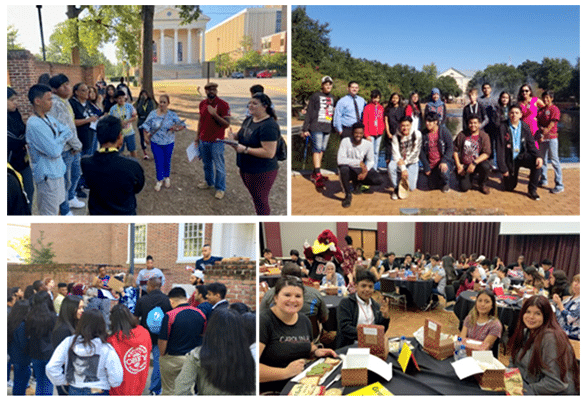
On September 20, the University of South Carolina hosted “Dreaming Beyond Graduation,” an event where Holmes Scholars Ayan Mitra, Lydia Carnesale, Priscila Costa, and Shelby Gonzales participated in various capacities. The event was sponsored by Richland One School District (R1) and the University of South Carolina (UofSC). The College of Education, through the Office of Diversity, Equity, and Inclusion, organized the event in partnership with the International Students Service, Admissions Office, the University Visitor Center, and Russell House University Union.
24 Oct2019
By Ryan Carrillo
The Teacher Diversity Research Award is presented by the AACTE Diversified Teacher Workforce (DTW) Topical Action Group (TAG) for outstanding research and advocacy related to various policies, practices, programs, pedagogies, systems, and/or institutions for the purpose of advancing teacher diversity. The research leadership embodied by the recipient of this award reflects the DTW TAG’s mission and goals and advances our current understanding of how to diversify our teacher workforce to enhance educational opportunities for all students. Recipients of this award have published articles, books, and /or created professional development services or products that function as tools and resources to help facilitate teacher education programs, leaders, and/or policymakers in strategic planning and project implementation that actualize the goal of creating a diverse teacher workforce in the 21st century. In addition, recipients of this award will evidence a service-minded disposition toward addressing teacher diversity in research and practice through their leadership and participation in the local community, school, and/or grassroots service efforts.
In recognition and honor of this important work, the recipient of this award will receive a $1,000 honorarium and be invited to give a featured research talk at our 2020 DTW Institute at the 2020 AACTE Annual Meeting in Atlanta, GA. Also, the recipient of the award must participate in the 2020 DTW Teacher Diversity Research Award Selection Committee and /or contribute to the planning of the 2021 DTW Institute.
In order to nominate someone (self-nominations accepted) for the DTW Teacher Diversity Research Award, email the following documents with “Teacher Diversity Research Award” as the subject line to Marvin Lynn at coe-dean@pdx.edu by December 15, 2019:
24 Oct2019
By Azaria Cunningham

Congratulations to Claudine McLaren Turner, Holmes Scholar of the Month for October 2019! Turner is a Ph.D. candidate and a Holmes Scholar at the University of Central Florida. Her research interest resides in teaching in higher education, and is currently investigating professional access and equity in higher education.
Turner’s published works have examined the experiences of former foster care youth and Black male professionals in institutions of higher education, as well as institutional diversity initiatives in postsecondary education. Most recently, she completed the final revision of a co-authored book chapter titled “Still Lifting as We Climb: Sisters of the Academy on Being Queen Mothers.” The book is scheduled for publication in fall 2019.
24 Oct2019
By AACTE
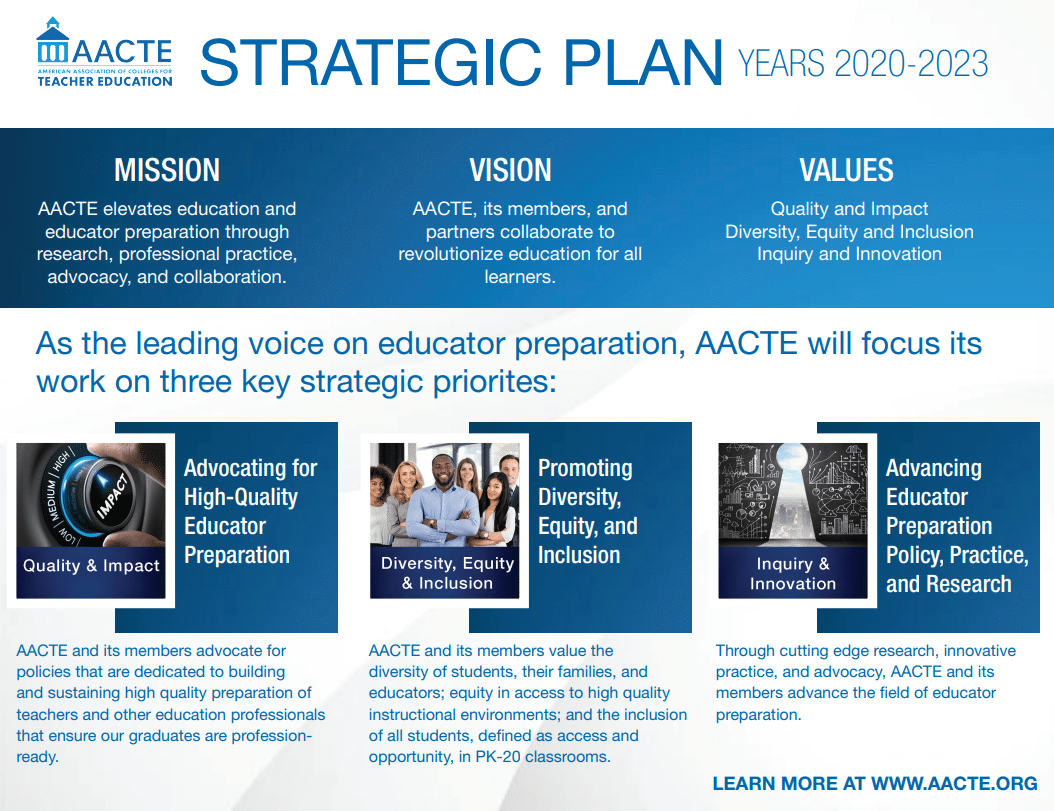 The American Association of Colleges for Teacher Education (AACTE) publicly announced today their new strategic plan effective through 2023. The plan reflects the Association’s ongoing commitment to high-quality educator preparation while leveraging opportunities to be forward thinking in addressing challenges that come from an ever-changing educational landscape.
The American Association of Colleges for Teacher Education (AACTE) publicly announced today their new strategic plan effective through 2023. The plan reflects the Association’s ongoing commitment to high-quality educator preparation while leveraging opportunities to be forward thinking in addressing challenges that come from an ever-changing educational landscape.
“It positions AACTE to truly revolutionize educator preparation,” said Kim Metcalf, chair of the AACTE Board of Directors and dean of the college of education at the University of Nevada Las Vegas. “It provides AACTE members support and encouragement to be innovative in ways that address not just today’s needs in our local communities, but the needs that those communities will have in years to come.”
22 Oct2019
By Deborah Koolbeck
The Problem

As educators, protecting and nurturing the health and well-being of our nation’s most precious investment—our youth—is always top of mind. Safeguarding their welfare and creating supportive learning ecosystems should be national priorities. Unfortunately, no one piece of legislation, no one initiative, no one activist, or caring teacher can bring that umbrella of safety to every student, everywhere, all the time. What we need to be talking about openly and often across the nation is prevention: training, learning, and preparing. This begins at the federal level with funding to equip our state and local leaders with the tools necessary to create and foster a safe and balanced learning environment for all students.
There are classrooms and schools in this country where teachers are armed with weapons. It is a dark reality, and one that AACTE does not support. Federal funds should not be used to arm teachers. Funds should instead be used to incentivize building learning communities through supportive training in social and emotional learning, and to prepare profession-ready teachers. Federal money
22 Oct2019
By Jane E. West

This blog post is written by AACTE consultant Jane West and is intended to provide update information. The views expressed in this post do not necessarily reflect the views of AACTE.
November 21 Deadline Looming to Fund the Government: Will Congress Act?
Just before Congress left town for their 2-week recess, they passed a short-term funding bill to keep the government open, but only until November 21. As that deadline comes closer, the pressure to act increases. The ball is in the Senate’s court, as the House has passed 10 of its 12 funding bills.
The Senate is planning to move bills next week, but hot-button issues related to the border wall, homeland security, and abortion will likely crop up, as well as significant funding level differences between the House and the Senate that will likely hold things up.
Possible outcomes include another short-term spending extension (perhaps through December),
21 Oct2019
By Jerrica Thurman
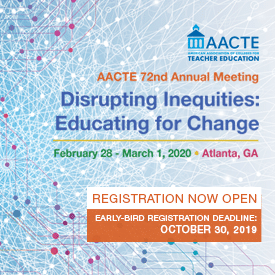 Time is running out to take advantage of the Early Bird Registration rate for AACTE’s 72nd Annual Meeting in Atlanta, Georgia! This special offer expires October 30 at 11:59 p.m. EDT.
Time is running out to take advantage of the Early Bird Registration rate for AACTE’s 72nd Annual Meeting in Atlanta, Georgia! This special offer expires October 30 at 11:59 p.m. EDT.
At the Annual Meeting, you’ll get a high value for your registration dollar. Hundreds of enriching sessions, networking opportunities, multiple meals and receptions, and access to the latest research and best practices are all included—giving you a great bang for your buck!
Get inspired at the Opening Session with keynote speaker Robin DiAngelo, who coined the term “white fragility” in an academic article and influenced the national dialogue on race. Then during the Closing Session, you will hear from keynote speaker Rodney Robinson, the 2019 National Teacher of the Year. Six Deeper Dive sessions, offered in three stand-alone time blocks, will provide valuable ideas and tangible tools you can take home to drive change in your local institution and community.
Join educators from across the nation in sharing research, experiences, and collegial feedback to move forward “Disrupting Inequities: Educating for Change.” Plan now to attend the AACTE 72nd Annual Meeting, February 28 – March 1, 2020, at the Marriott Marquis Atlanta Hotel. Register by October 30 to take advantage of our Early Bird registration rates.
Learn more about the conference theme, schedule, and venue at aacte.org. Follow us on Twitter and Facebook and join the conversation using #AACTE20.
18 Oct2019
By Ward Cummings
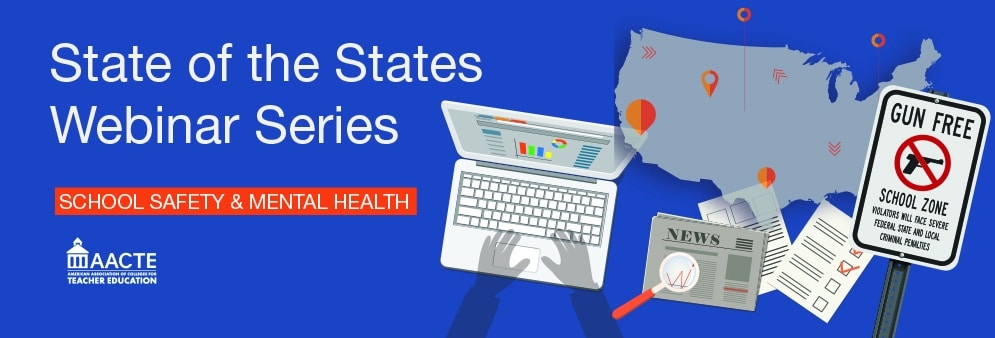
Around the country, regulators and legislators are demonstrating that they understand the urgent need to promote school safety. The 2019 state legislative session was an active one on the subject. Hundreds of bills were introduced covering every aspect of the matter from prevention to response. Join me as I present a wide-ranging overview and analysis of some of the most noteworthy school safety bills introduced over the year, with a particular focus on legislation impacting student and teacher mental health, in an upcoming State of the States webinar.
We encourage you to register in advance for the member-exclusive State of the States webinar, which will take place Thursday, October 31 from 11 a.m. to noon ET.
There will be time at the end of the webinar for questions and answers. The webinar will be recorded and posted on the website for future viewing.
For questions, please contact me at wcummings@aacte.org.
18 Oct2019
By Toni Molle
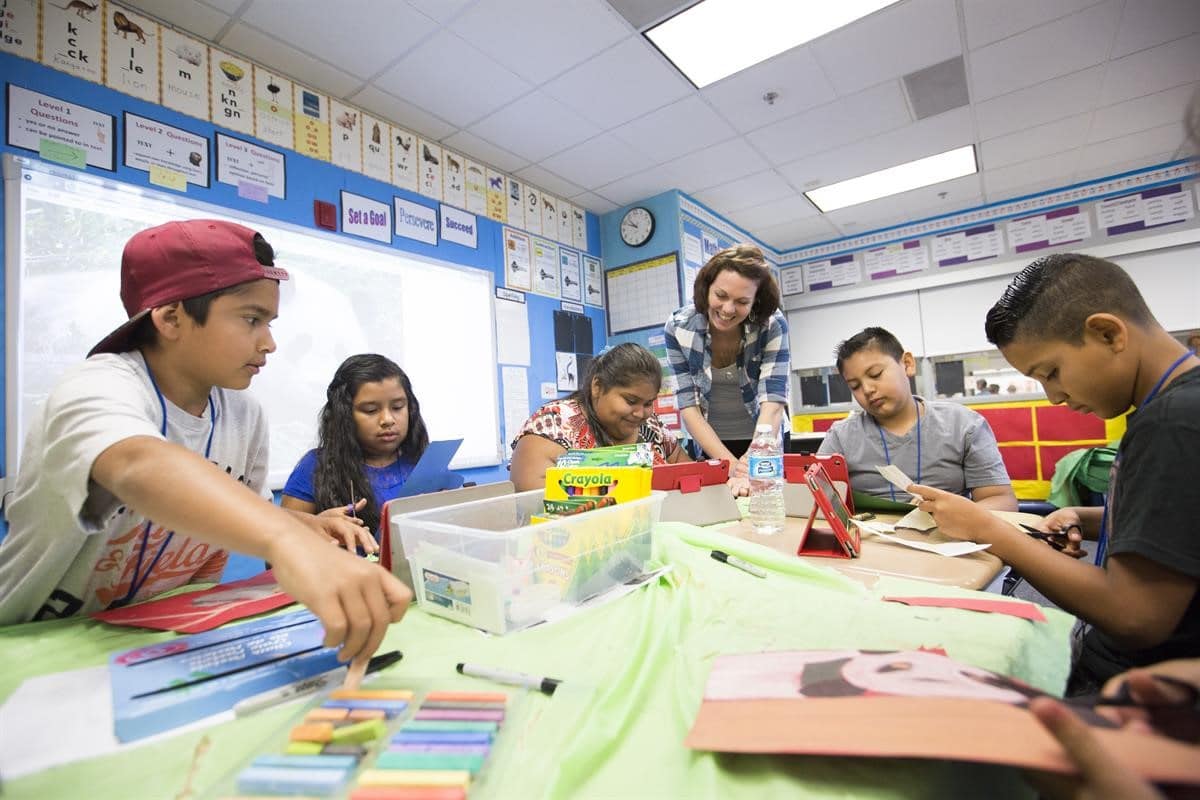
Photo: Courtesy of The California State University
This article and photo originally appeared on The California State University website and are reprinted with permission.
Three California State University (CSU) campuses were awarded nearly $3 million from the U.S. Department of Education’s Teacher Quality Partnership (TQP) program to recruit and prepare science, technology, engineering, mathematics (STEM) and computer science teachers to serve students in low-income and high-need schools throughout the state. California State University campuses in Chico ($1,027,195), Dominguez Hills ($1,028,844) and Monterey Bay ($811,719) have received a total of $2,867,758 in funding for the program.
“Collaboration is a key component among educators,” said Marquita Grenot-Scheyer, assistant vice chancellor for Educator Preparation at the CSU Chancellor’s Office. “By expanding the ongoing collaborative partnerships between the CSU and high-need school districts and through development of engaging STEM and computer science programs, more students will succeed in the classroom.”
18 Oct2019
By Anne Cantrell

Photo by Adrian Sanchez-Gonzalez
This article and photo originally appeared on the Montana State University website and are reprinted with permission.
Montana State University’s Department of Education and its partners have received funding totaling $6.2 million for a program delivered mostly online that is designed to recruit, train and mentor dozens of high-quality educators to work in rural areas of Montana.
The funds include a $3.1 million grant from the U.S. Department of Education and more than $3.1 million in matching funds and services from nearly a dozen partner organizations. They will be used for a five-year project, “Addressing Rural Recruitment and Retention in Montana,” that aims to address a shortage of teachers in rural locations across the state.
“We are excited to provide training and professional development in the first two years of their teaching careers to residents of rural, high-needs communities along with the Montana Office of Public Instruction and our many statewide partners,” said MSU education professor Ann Ewbank, the project’s principal investigator.
“Our common goal is to ensure that every student, from Broadus to Lolo, and from Scobey to Troy, has access to highly effective educators,” Ewbank added. “The Teacher Quality Partnership grant has the potential to strengthen K-12 education in rural communities. When rural schools thrive, Montana thrives.”
18 Oct2019
By Lynn M. Gangone
Last month, the AACTE Board of Directors approved the Association’s new strategic priorities. Along with our new vision, mission, and core values, these priorities will guide AACTE’s work. Our values of diversity, equity, and inclusion; inquiry and innovation; and quality and impact will permeate all of our initiatives. Please take a few minutes to watch the video (or read the transcript) to learn more.
AACTE collaborates with its members and partners to revolutionize education for all learners. Learn more at aacte.org. And stay tuned for our November Board of Directors elections!
P.S. Secure your spot for AACTE’s 2020 Annual Meeting at the early bird rate by October 30!




 In 2017-18, North Carolina reported 1,618 teacher vacancies. Those represented classrooms that were without a teacher at worst or were without a properly trained teacher at best. At the same time, enrollment in the UNC system’s schools of education has dropped 30% since 2010.
In 2017-18, North Carolina reported 1,618 teacher vacancies. Those represented classrooms that were without a teacher at worst or were without a properly trained teacher at best. At the same time, enrollment in the UNC system’s schools of education has dropped 30% since 2010.




 Time is running out to take advantage of the Early Bird Registration rate for
Time is running out to take advantage of the Early Bird Registration rate for 

